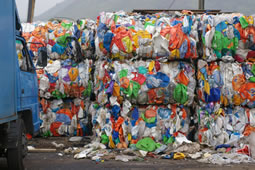Consumption of plastic in Germany continues to increase. The issue of waste utilisation in Germany has been clarified: more than 96 per cent of plastic waste is now utilised. Consequently, plastics are an important resource even after their first usage phase.
 (01.06.2010) These are the most significant results of the new study entitled Produktion, Verarbeitung und Verwertung von Kunststoffen in Deutschland 2007 (Production, processing and utilisation of plastics in Germany 2007). The recently published study was commissioned by Beteiligungs- und Kunststoffverwertungsgesellschaft mbH (BKV) and PlasticsEurope Deutschland e.V. with the collaboration of important plastics-relevant associations in Germany and was conducted by Consultic Marketing und Industrieberatung for the sixth time.
(01.06.2010) These are the most significant results of the new study entitled Produktion, Verarbeitung und Verwertung von Kunststoffen in Deutschland 2007 (Production, processing and utilisation of plastics in Germany 2007). The recently published study was commissioned by Beteiligungs- und Kunststoffverwertungsgesellschaft mbH (BKV) and PlasticsEurope Deutschland e.V. with the collaboration of important plastics-relevant associations in Germany and was conducted by Consultic Marketing und Industrieberatung for the sixth time. | Copyright: | © Deutscher Fachverlag (DFV) |
| Quelle: | Entsorga China 01_2010 (Juni 2010) |
| Seiten: | 1 |
| Preis: | € 0,00 |
| Autor: | Martin Boeckh |
| Artikel nach Login kostenfrei anzeigen | |
| Artikel weiterempfehlen | |
| Artikel nach Login kommentieren | |
Stand der Pumpspeicher in Deutschland 2025
© Springer Vieweg | Springer Fachmedien Wiesbaden GmbH (12/2025)
Infolge des Ausbaus der Stromerzeugung aus erneuerbaren Energien ist ein erhöhter Speicherbedarf im Stromverbundnetz notwendig. Hierdurch steigt die Bedeutung von Pumpspeichern als bis auf weiteres einzige Möglichkeit für eine großmaßstäbliche Stromspeicherung.
Pumpspeicherkraftwerke - Empfehlungen zur Verkuerzung und Vereinfachung von Genehmigungsverfahren in Deutschland
© Springer Vieweg | Springer Fachmedien Wiesbaden GmbH (12/2025)
Die Genehmigungsverfahren sind sehr komplex sowie mit hohen Kosten und rechtlichen Unsicherheiten verbunden und dauern oftmals mehr als zehn Jahre.
Revitalisierung des Pumpspeicherwerks Happurg - Sanierung des Oberbeckens
© Springer Vieweg | Springer Fachmedien Wiesbaden GmbH (12/2025)
Im Rahmen der Revitalisierung des Pumpspeicherwerks Happurg haben im September 2024 auch die Arbeiten zur Sanierung des zugehörigen Oberbeckens begonnen.